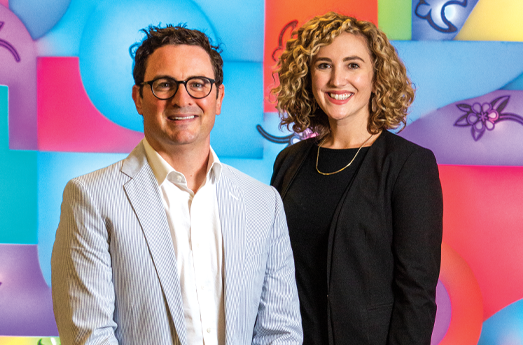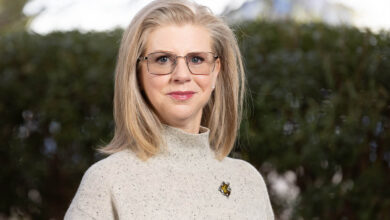
Children’s Clinics Marks 30 Years
Coordinated Care Model Adeptly Serves Southern Arizona Youth
By Monica Surfaro Spigelman
Children with complex medical needs and their families have found respite in Children’s Clinics for the past 30 years.
This special Southern Arizona medical facility provides family-centered comprehensive medical, rehabilitative and social care for more than 5,500 children challenged with severe illnesses, chronic diseases or conditions with functional impairment.
A welcoming, coordinated point of healthcare access for these special kids is the goal, said Jared Perkins, CEO of Children’s Clinics. “It’s often difficult to navigate care because treatment is so complex,” he explained. “There are critical gaps beyond emotional and financial, and our kids need intensive support. They need coordination through one medical home, and we provide it for them.”
Square & Compass Origins
Children’s Clinics is housed in a 50,000-square-foot facility on the campus of TMC Healthcare, built in 1991 by philanthropic partner Square & Compass, a nonprofit with a legacy of caring for medically challenged children of Southern Arizona and northern Mexico for more than 75 years.
The partnership began in post-war Tucson in the late 1940s, when the polio epidemic was at its peak. With no rehabilitation center available for vulnerable children, a group of Freemasons, led by Tucson businessman Ted Walker, converted a backyard, 500-square-foot playhouse near Fort Lowell and Country Club roads into a therapy center.
When hundreds of children began overwhelming the small playhouse each week for therapies, a plan for a permanent facility was put in place. With help from local carpenters, brick layers and Sundt Construction, a new facility opened on Broadway in 1950 under the name, Square & Compass Crippled Children’s Clinic. Its name honored the two architectural tools that best represent the masons’ craft.
“Children are always at the core of our service,” said Square & Compass Executive Director Amy Burke.
Decades after the Broadway clinic opening, continued expansion of services included orthopedics, cardiology, audiology and orthodontics. When the healthcare system began a dramatic overhaul in the 1980s, Walker saw that the system required a new approach, Burke recalled. Children’s Clinics opened on the TMC campus with a uniquely coordinated model.
Rehabilitation through State Models
Under Arizona’s Children’s Rehabilitative Services program, originally created in 1929, children with complex healthcare needs who are served under the Arizona Health Care Cost Containment System can receive services through one of the state’s four Multi-Specialty Interdisciplinary Clinics, or MSICs. Children’s Clinics is the MSIC serving all of Southern Arizona except Yuma.
Communication is at the heart of the MSIC care model, said Dr. Sydney Rice, medical director of Children’s Clinics. “It sounds so simple, yet it’s actually incredibly difficult to coordinate the time of what may be 10 or more specialists for the care of one sick child,” Rice said. “The co-location of needed specialists allows families to schedule multiple appointments during the same visit. Because transportation alone causes stress for families, the ability to see more than one doctor and receive therapies on the same day is essential for the wellbeing of families who just want the best care for their child. The MSIC model pulls it all together.”
Children’s Clinics coordinates with clinical partners TMC Healthcare, Banner-University Medical Center, University of Arizona College of Medicine and physicians and dentists from across the community. There are more than 20 different medical specialties, primary care, rehabilitative therapy services and behavioral health programs offered. Siblings also may receive care at the Children’s Clinics, which had more than 40,000 visits in 2019.
“There’s a comprehensive standardized care plan for each child,” said Rice. “The success of the clinics lies in its commitment to provide families with the resources they need to successfully support the total child. We really treat the patient and family together as one unit – our approach is focused on the family, and we stay with that family even as the child grows through teenage years and young adulthood.”
This approach recognizes that a child’s necessities go beyond physical health. “Our kids will miss traditional childhood rituals, such as playing a team sport, because of their conditions,” said Perkins. “And so, our team organizes both adaptive recreation, like dance or basketball, and special events, like Halloween, back-to-school haircuts or riding in El Tour on bikes we customize. We want all the kids to have experiences and the memories that go along with them.”
Focusing on the Future
“It’s important to remember that we’re always in pursuit of our mission, because the mission evolves as special needs of our children change,” Perkins said. “Behavior was a care area often under the radar for our children, but Children’s Clinics now is uniquely prepared to evolve and respond to take care of behavioral health needs just as complex as the physical conditions.”
Multidisciplinary care for children diagnosed with behavioral issues recently gained momentum when Children’s Clinics was selected as a 2019 Angel Charity for Children beneficiary. This accomplishment resulted in a $1.5 million facility remodel, creating the Angel Charity Center for CARE (Comprehensive Autism and Rehabilitative Excellence).
The remodel includes six physical and occupational therapy gyms, three sensory rooms, two feeding therapy rooms, seven consult rooms for speech therapy, nutrition, audiology, an outdoor multi-use therapy space and experiential activities for the lobby area.
Another ongoing priority is research. “We saw an opportunity to help our kids with cerebral palsy, who tend to dislocate their hips,” said Perkins. “If we could identify markers to catch problems before the hip dislocates, we could do therapy adjustments that would reduce surgeries, costs, and, most importantly, stresses for the children and families.”
Because Children’s Clinics cares for most children with cerebral palsy in Southern Arizona, they coordinated with physicians and providers to develop a “hip surveillance program.” A system was developed and implemented two years ago, effectively stopping at least four hip dislocations. Children’s Clinics was the first to establish such a program in the United States.
Shared Vision
Making Children’s Clinics’ ambitious agenda all the more possible are the partnerships which further the conversation about wellbeing for challenged children. “There’s a shared community conscience behind our success, which actually is the success of all Tucson healthcare,” Perkins said.
Mimi Coomler, the former Children’s Clinics CEO who now is senior vice president and COO for TMC Healthcare, agreed: “Organizations are built on community priorities. There was the question, ‘how do we best set up a system to serve these children?’ You need a set of very specific resources to support them. And Children’s Clinics is the one Tucson center where partners can come together and ensure that children with these complex needs have care all in one place.”





